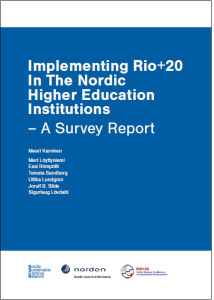According to Nordic universities, sustainable development should be further integrated not only to campuses but also to teaching.
The results of the sustainable development survey of the Nordic Rio+20 project were released in Oslo on 12 November 2015.
The Rio+20 project of the Nordic Sustainable Campus Network, which is coordinated by Aalto University, mapped the implementation of sustainable development in Nordic universities. The framework for the survey was the universities' commitment at the UN's Rio+20 summit. The aim of the commitment is to integrate sustainable development into universities' research and teaching, campus solutions and social interaction. The survey of sustainable development was implemented through a questionnaire, which had 152 respondents from 51 Nordic universities.
According to the survey, the universities are doing promising work in the development of sustainable campuses. For example, Aalto University is currently involved with a project the goal of which is to make Otaniemi an emission-free and energy-sufficient community by 2030.
Training for the teachers
According to the survey, however, it would be important to pay further attention to the integration of sustainable development into teaching. This requires that more training and support is provided for university teachers. In Aalto University, support for teachers' training is included in the sustainable development operating plan for 2016.
– As education providers, universities play an important role in the building of sustainable future. Future decision-makers grow up in higher education institutions, and it is important, for this reason, that sustainable development is integrated in pedagogical training and in learning outcomes, says Meri Löyttyniemi, Chair of the Nordic Sustainable Campus Network (NSCN), from Aalto University.
Students and committed decision-makers in key roles
There is still room for development also in the supervision and management of sustainable development. The control is quite strong only in Sweden because the country's university legislation requires that sustainable development is integrated in all operations of the university. According to the survey, the most important factors promoting sustainable development in universities are projects implemented in cooperation with students, student initiatives, cooperation between fields of science and decision-makers committed to the matter. On the other hand, sustainable development is constrained for example by decision-makers' lack of knowledge, by scarcity of resources and by inadequate goals for sustainable development.
– To achieve the goals in the Nordic countries, a more courageous approach is needed to integrate sustainable development in all activities. Nordic universities could act as examples, even internationally, in this matter, thus also implementing the goals of the Rio+20 commitment, Löyttyniemi points out.
Next, NSCN will launch a project managed by Aalto University, which focuses on the measurement and improvement of students' literacy in relation to sustainable development. This will be done with the help of an international sustainability literacy test, the SuLiTest.
Nordic Sustainable Campus Network (NSCN) is a university network established and coordinated by Aalto University. NSCN supports universities' sustainable campus work and promotes the integration of sustainable development into teaching and research. Its activities have been funded by the Nordic Council of Ministers. The partners of the Rio+20 project are the universities of Copenhagen, Gothenburg, Iceland and Oslo, Kungliga Tekniska Högskolan in Sweden and the Lappeenranta University of Technology in Finland.






 Except where otherwise stated, content on this site is
licensed under a Creative Commons Attribution 3.0 License.
Except where otherwise stated, content on this site is
licensed under a Creative Commons Attribution 3.0 License.
